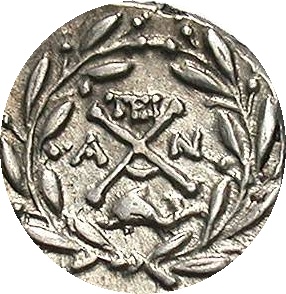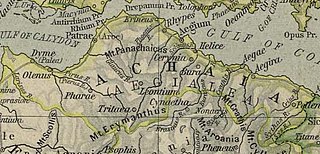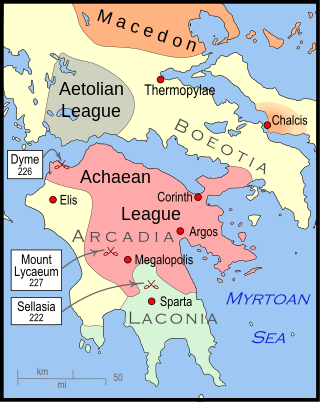Year 245 BC was a year of the pre-Julian Roman calendar. At the time it was known as the Year of the Consulship of Buteo and Bulbus. The denomination 245 BC for this year has been used since the early medieval period, when the Anno Domini calendar era became the prevalent method in Europe for naming years.
Year 251 BC was a year of the pre-Julian Roman calendar. At the time it was known as the Year of the Consulship of Metellus and Pacilus. The denomination 251 BC for this year has been used since the early medieval period, when the Anno Domini calendar era became the prevalent method in Europe for naming years.
Aegialeus is the name of several individuals in Greek mythology or literature:

Sicyon or Sikyon was an ancient Greek city state situated in the northern Peloponnesus between Corinth and Achaea on the territory of the present-day regional unit of Corinthia. An ancient monarchy at the times of the Trojan War, the city was ruled by a number of tyrants during the Archaic and Classical period and became a democracy in the 3rd century BC. Sicyon was celebrated for its contributions to ancient Greek art, producing many famous painters and sculptors. In Hellenistic times it was also the home of Aratus of Sicyon, the leader of the Achaean League.

Cleomenes III was one of the two kings of Sparta from 235 to 222 BC. He was a member of the Agiad dynasty and succeeded his father, Leonidas II. He is known for his attempts to reform the Spartan state.

The Achaean League was a Hellenistic-era confederation of Greek city states on the northern and central Peloponnese. The league was named after the region of Achaea in the northwestern Peloponnese, which formed its original core. The first league was formed in the fifth century BC. The second Achaean League was established in 280 BC. As a rival of Antigonid Macedon and an ally of Rome, the league played a major role in the expansion of the Roman Republic into Greece. This process eventually led to the League's conquest and dissolution by the Romans in 146 BC.

Aratus of Sicyon was a politician and military commander of Hellenistic Greece. He was elected strategos of the Achaean League 17 times, leading the League through numerous military campaigns including the Cleomenean War and the Social War.
Aegineta was an ancient Greek modeller mentioned by Pliny the Elder. Some scholars supposed that the word Aeginetae in the passage of Pliny denoted merely the country—Aegina—of some artist, whose real name was not given. The consensus of scholarly opinion is now against this hypothesis, however, and it is generally believed that "Aegineta" was the man's given name.

The Battle of Dyme or Dymae was a battle that was fought by the Achaean League under the command of their Strategos, Hyperbatas, and a Spartan army under the command of King Cleomenes III, and was part of the Cleomenean War. The battle took in place near Dyme in north-west Achaea and was fought in 226 BC.
Lydiadas of Megalopolis was an ancient Greek tyrant of his city Megalopolis in Arcadia. He came to power around the year 245 BC, but after ten years he decided to step down, leading his city to join the Achaean League. As a reward the Achaeans elected him to the post of strategos, that is of the League, for three terms in 234/33, 232/31 and 230/29 BC. In 227 BC he lost the elections against Aratus of Sicyon, but was chosen as hipparch, in this position he fell at the gates of his city during a cavalry charge against the Spartan king Cleomenes III.
Aristomachos of Argos was a general of the Achaean League in Ancient Greece who served only for a year, 228 – 227 BC. His father Aristomachos the Elder and his brother Aristippos had both been tyrants of the city of Argos, and after the latter's death in 235 the younger brother became tyrant himself. In 229 he was convinced to resign by Aratus of Sicyon and let his city join the Achaean League. As a reward, he was elected strategos of the League. Later he betrayed Argos to Cleomenes of Sparta. When Argos was retaken by the forces of Achaea and Macedonia, he was tortured and executed, probably in 223 BC.
Hyperuatas or Hypervatas was a general of the Achaean League in Ancient Greece who served only for a year, 226–225 BC.
Timoxenos was a general in Ancient Greece, who served for three or four terms as strategos of the Achaean League between 226 and 215 BC. He was considered a supporter of Aratus of Sicyon.

The Cleomenean War was fought between Sparta and the Achaean League for the control of the Peloponnese. Under the leadership of king Cleomenes III, Sparta initially had the upper hand, which forced the Achaean League to call for help the Macedonian king Antigonos Doson, who decisively defeated Cleomenes in the battle of Sellasia in 222.
Eperatus of Pharae in Achaea was an Ancient Greek general of the 3rd century BC.

The Social War, also War of the Allies and the Aetolian War, was fought from 220 BC to 217 BC between the Hellenic League under Philip V of Macedon and the Aetolian League, Sparta and Elis. It was ended with the Peace of Naupactus.
Aristotle of Argos, was a political leader in Argos and a friend of Aratus of Sicyon. In 224 BC he belonged to the party at Argos which was hostile to the Spartan king Cleomenes III. After Cleomenes had taken possession of the city, Aristoteles attacked the Spartan garrison to lead his city again into the Achaean League.

The Battle of Mount Lycaeum was a battle fought between Sparta led by Cleomenes III and the Achaean League commanded by Aratus. It was the first major battle of the Cleomenean War. The battle occurred at Mount Lycaeum on the border of Elis and Arcadia and ended in a Spartan victory.
Aristippus of Argos was a tyrant of Argos in the 3rd century BC. His grandfather may have been the Aristippus installed as tyrant by the Macedonian king Antigonus II Gonatas in 272, and his father was the tyrant Aristomachos the Elder. When Aristomachus was assassinated by slaves in 240, Aristippus took control of the city.
Aristotle the Dialectician, was an ancient Greek philosopher from Argos who was a member of the Dialectical school.





